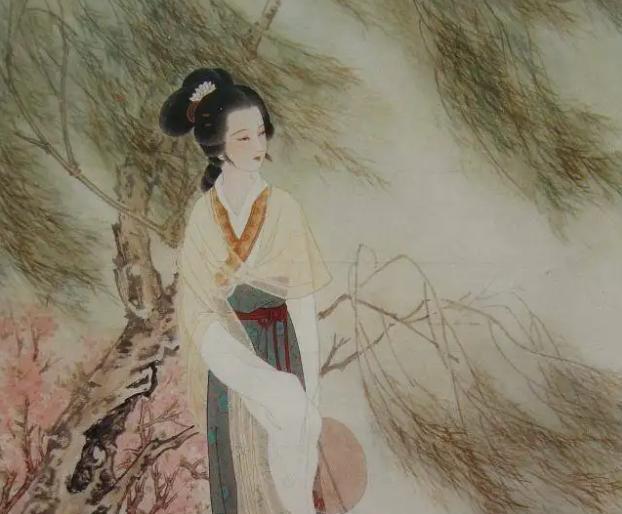The poem of grievances is the literary theme of classical Chinese poetry. In ancient times, the low status of women, men were tied up by fame and fortune, and had to stay in a foreign country for a long time, which led to women often staying alone in empty houses and enduring endless loneliness and loneliness.

The Song Dynasty lyricist Qin Guan once wrote a poem "Southern Songzi. Xiangmo Bending Painting", depicting the scene of a woman guarding an empty house alone, its words are:
Fragrant ink bends and draws, swallow fat is light and even. Rubbing the blue shirt apricot yellow skirt, leaning on the jade and nodding her lips wordlessly.
People go to the empty water, and the flowers fly half cover the door. Where do you find the clouds in the chaotic mountains? Another crescent moon shines at dusk.
The upper part of the word describes the scene when the woman wears makeup. Xiangmo refers to the snail and swallow fat used by ancient women's thrushes, that is, rouge for face rubbing.
The woman draws her curved eyebrows with a snail and applies rouge evenly to her face. The two sets of overlapping words "bending" and "light" more vividly interpret the beauty and moving of women.
The heroine wears a blue shirt and an apricot yellow long skirt underneath, and the color is so bright and bright. She leaned against the railing and silently lit her lips with sandalwood paint.
At this time, the woman, with thick black eyebrows, red lips, blue blouse, and long apricot yellow skirt, was picturesque, as if she were a lady with a heavy color pen, silently staring at the sky and the distance.
The ancients had clouds: "Soldiers die for those who know themselves, women are pleasing to themselves", women wear heavy makeup, why? It is definitely not to show yourself, but to dress up for your sweetheart to see, but the sweetheart is not around, this scene is really sentimental.
The lover, like flowing water, disappeared without a trace, and he half-covered the door, expecting his sweetheart to return as soon as possible. If the word "flowing water" symbolizes the thin feelings of leaving people, "huafei" symbolizes the endless sorrow of women and the youth that is about to pass away.
"People go to the empty water, flowers fly half cover the door" is written beautifully and wonderfully, which is a common imagery in classical Chinese poetry, which seems to be insignificant, but it leaves the reader with unlimited imagination space, which is the blank space in the eyes of the ancients.
The woman who misses the disease is like a chaotic mountain, but she has never been able to find a sweetheart who is floating like a cloud, a "chaotic" word, which vividly depicts the woman's lonely but helpless state of mind at this time, which is really "cutting continuously, rationalizing and chaos".
In this way, the woman waited until dusk, the last touch of sunset gradually disappeared, and the moon gradually hung on the edge of the sky, the moon, as slender as a woman's eyebrows, is really not round, it is difficult for people to reunite.
In this way, the woman ended a day of waiting and anticipation in helplessness. Such a day has become the whole of her life, I don't know how many more days will be lived like this, how much youth can be consumed like this?
The upper part of the word is brightly colored, and the lower one is sad and lonely, forming a sharp contrast, but it also perfectly sets off the woman's inner emotions, which can be described as a masterpiece in the words of grievances.